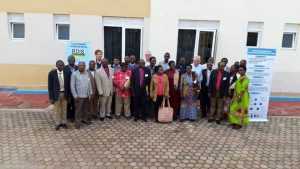
On 29th September, participants had chance to visit the Rural Development inter-diocesan service stove project in the Anglican Church of Rwanda, Shyogwe diocese. During this exposure, the Rt. Rv. Dr Jered Kalimba took the opportunity to present to the participants the philosophy of the church towards the stewardship of god’s creation in these words: Today’s exposure visit aims at sharing with you the work being done by our four dioceses through the Rural Development Inter-diocesan Service which is a church right hand meant to bring about social and economic development in the Southern and Western provinces of Rwanda.
As we all know, the earth and all life on it are Integral part of God’s creation. We are called to safeguard and take care of it. In the very beginning of time, God created all that is, and proclaimed it good (Genesis 1:1–31). He instructs us to “cultivate and care” for creation (Genesis 2:15). God also told Moses to make sure the Israelites let their land lie fallow every 6 years, giving the land itself a Sabbath, or time to rest (Leviticus 25:4–5). The Scriptures remind that creation belongs to God and reveals his goodness (Romans 1:19–20, 1 Corinthians 10:26), which invites us to respect our Creator by caring for nature.
Role of the church in addressing climate change
Therefore, EAR/ Dioceses of Butare, Cyangugu, Kigeme and Shyogwe, work tirelessly to care for the environment through different activities and programs to mention:
- Training volunteers as community environment animators and environment conservation promoters
- Enabling the local churches to set their disaster management plan
- Training and sensitization on energy saving stoves
- Installing solar panels in the rural areas
- Training on soil management and erosion prevention
- Distribution of seedlings (more than 3 million seedlings were distributed in 7 years ago)
- Distributed more than 13000 Improved Cook stoves and 1050 Ceramic Water Filters to poor rural households in South and West and Rwanda
- Follow up, supervision and monitoring
EAR commitments vi-à-vis the preservation of the environment
Given that the church is aware of the prevailing situation of climate change, it has opted to the following:
- Take measures to reduce the harm that ourselves do to the environment.
- Encourage our local churches and local communities to adopt policies and practices that minimize environmental damage through establishment of environmental clubs in church schools, Vocational training centers etc.
- Include environmental stewardship into the curriculum of bible and development schools and theology colleges
- Owning and promoting environmental public policies and procedures
- Environmental care and disaster risk reduction should always be part of the church strategic plan and annual plan
- The four dioceses established a church based organization by name Rural Development Inter- Diocesan Service (R.D.I.S) and assigned it an environmental care mandate (To safeguard the environment, increase production aiming at sustainable and holistic development)
We must admit that keeping the environment clean and unpolluted, caring for all species, leaving the earth as undamaged as possible for the next generation models respect for our Creator, love for our fellow human beings (even those yet to be born), and the selflessness of Christ to a self-consumed world.
Christians are thus urged to take the lead in ensuring that the beauty and majesty of God’s creation are sustained. We believe that these efforts will help ensure the protection and health of future generations, will be a blessing to people all around the world (especially the poor), will improve our witness to a watching world, and most of all, will express our love and worship for our Creator, Redeemer and Friend.